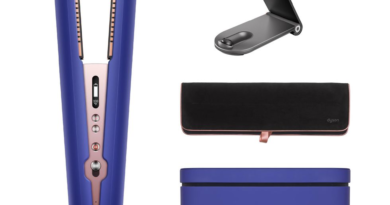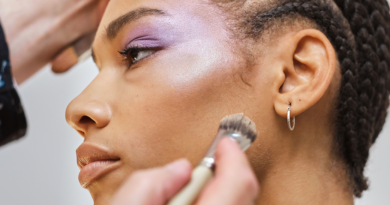Pamela Anderson Is Savoring This
Style Points is a weekly column about how fashion intersects with the wider world.
“I’m up for anything. What do you want to know?”
That’s how Pamela Anderson begins our conversation. It’s morning where she is, namely, at her rustic home on Vancouver Island, off the coast of Canada. Anderson has already been up for a while; she says this is her favorite time of day. She’s been spending the dawn hours working on a newsletter, which she jokes she mainly does to avoid writing her kids “long, rambling emails.” She’s also working on a novel which she describes as “very romantic and sexy and traumatic and funny.”
“If I’m not writing, I know I’m not in a good place,” she says. “If I’m writing, I am in my body. I am where I’m supposed to be.” She misses the days of letter writing, and the ritual takes her back to a pre-social media, pre-texting era. “I guess everybody always romanticizes the past,” she says. “You want to be kind of OG.”
She would know. Anderson’s past has been everywhere in fashion’s present lately: #Pamcore is perpetually trending, her iconic looks (that “Girl” baby tee! The proto-motomami looks from Barb Wire!) have found a second life on Instagram and TikTok, and her trick for creating an updo using a G-string even went viral. In a turn that’s surprising even to her, she’s become a full-fledged fashion insider, opening the Hugo Boss show, sitting front row at Jacquemus, and now, starring in Aritzia’s fall 2023 campaign for its Babaton collection. Shot near the Ladysmith home she’s now speaking to me from, the photographs give a witty, winking glimpse of her life now as Anderson brings plenty of what Aritzia CEO Jennifer Wong calls “her power-woman energy” to the table.
Working with a label from her home province was a natural fit for her. “We’re two Canadian brands colliding,” she jokes. Still, the fashion whirlwind is new to her. “When I was younger, I never thought that I would be in any campaigns, especially really recognizable ones. I always felt like I was an outsider, a little bit rebellious. So I’m laughing to myself, going, ‘Wow, I feel really in the zone and accepted by my peers lately.’”
When she first saw the sober suiting in the collection, she was nervous that it was a bit outside her style range. “But then I thought, ‘I know where I want to wear a suit: when I’m mowing the lawn and when I’m in the garden.’ I thought it was a great juxtaposition, because this is my office. They loved the idea, and said ‘We’ll come to you.’ And I said, ‘Well, it’s going to be kind of rustic….’”
“It could have been a disaster,” she laughs now. “I thought, ‘Oh my God, it’s just going to be this invasion.’ But it was so easy, a real pleasure.” What did the neighbors think? “They tune me out at this point. I’m in the woods, tucked away. But there’s always a little buzzing going on around here. There’s always something a little curious going on over on the ranch.”
Anderson likes that Aritzia is an approachable brand. “I come from people who were struggling to make ends meet sometimes,” she says. “I always say, money can’t buy taste. When you see someone head to toe in [runway] designs, you’re just like, ‘Well, that’s easy.’ But Vivienne Westwood was the first one to tell me, ‘Buy one thing a year. Don’t buy a lot of stuff.’”
While she hasn’t been following the #Pamcore hashtag (“My kids told me about it, because I don’t have these apps on my phone or anything. I refuse to,”) Anderson is aware of the obsessive interest in her ’90s style. She defines her aesthetic back then as “wild and uninhibited…I don’t know if it was a defense mechanism or what. I just thought, ‘I’m going to have fun.’” She often accessorized with “the makeup from the day before, and a little bit of glitter from two nights before. The stuff that never leaves you! I’d be volunteering at the kids’ school, and I would catch myself in a reflection, and I’d have glitter all over my face. Which doesn’t make you a bad mom, just because you’re covered in glitter.”
Her V.I.P. character Vallery Irons’ style, heavy on fuzzy sweaters, boas, and big sunglasses, drew heavily from her Great Auntie Vi. “She didn’t have a lot of money, but she had a lot of her own style,” she says. And the costuming soon bled into Anderson’s own wardrobe: “I would go out after work, still wearing the outfit.”
She also fondly remembers her crocheted looks, especially the tops and pants with the sides cut out. “I don’t even know how they stayed on, but they did!” She didn’t have a stylist back then. “I remember Tommy and I would just be like, ‘What can we wear that’s fun and crazy?’ I remember going to the Oscars in a jean miniskirt, with a D-Pimp necklace and tied shirt, next to Elizabeth Hurley, in this long Versace gown.
“Now, it’s all so calculated. And these are the looks that we’re inspired by now, because we lack that. We want that uniqueness. I never thought that those looks we threw together would be on mood boards.”
She’s also, of course, been following the Barbiecore trend. “Ruth Handler actually gave me one of the first Barbies. She was a neighbor. It was the first platinum Barbie, in a red bathing suit,” she remembers. That said, “I resonated more with Barbarella, or maybe Barb Wire, than Barbie,” she adds, laughing.
Though Anderson became known for ditzy roles, she maintains that you can’t be a dumb blonde and play a dumb blonde. “That was a great expression that Suzanne Somers told me. She used to always say, ‘Hi, dumb blonde.’ Meanwhile, she’s a gazillionaire, doing all these great things.” One word she doesn’t remember hearing is bimbo. But she did see being underestimated as a secret weapon of sorts. “I always thought it was fun to not have anything to live up to, because you could only surprise people. So it was to my advantage sometimes…and if people didn’t want to look at you as an intelligent person, because you looked a certain way? I think we’ve grown past that, hopefully.”
Since her memoir Love, Pamela came out earlier this year, “I get a lot of people walking up to me on the street, saying, ‘I had no idea who you were, and I’m sorry for all the ways I thought about you before, because I like you now.’ I’m just like, ‘What did you think of me before?’
“You don’t really think about it in the moment. You’re raising two kids, you’re trying to survive, your heart is broken, you’re trying to fill up your life with people and making mistakes. We’re all just trying to live every day. So, I guess, decades got away from me. And it was nice to come home, full circle. I’m working more than ever, when I thought I was retired!”
For Anderson’s book tour and recent appearances, including this campaign, she’s often been sporting a stripped-down look, going virtually makeup-free, unrecognizable from her past self but still seemingly very much in line with who she is at the core. Early on in her career, she says, she didn’t have a ton of input in terms of how she looked. “I just went along with what people were telling me what to do.” After her makeup artist, Alexis Vogel, tragically passed away from breast cancer, she abandoned her signature look. “She was the best. And since then, I just felt, without Alexis, it’s just better for me not to wear makeup.”
The new look has been “freeing, and fun, and a little rebellious too. Because I did notice that there were all these people doing big makeup looks, and it’s just like me to go against the grain and do the opposite what everyone’s doing.” Plus, she adds, “I think we all start looking a little funny when we get older. And I’m kind of laughing at myself when I look at the mirror. I go, ‘Wow, this is really…what’s happening to me?’ It’s a journey.” But largely a happy one. “I feel rooted for. I feel good. I’m in a good place.”
What’s been perhaps most surreal is seeing herself become an inspiration for designers. “You used to go to photo shoots, and they would show you mood boards,” asking whether you wanted to look like Marilyn Monroe or Brigitte Bardot, she recalls. Now, “they show me 10 pictures of me, and they go, ‘Which one do you want to look like now?’”
With that, it’s back to her quiet Canadian life. She’s been writing down recipes, thinking about doing a cookbook. “Not [to] really push veganism or anything like that, but just make vegetables more interesting.” She’s making pottery on her new wheel. (“I’m very crafty. I didn’t realize.”) She’s working in her 15,000-square-foot vegetable and rose garden, in clothes you might not be able to square with her Baywatch-babe days: “I’ve got my gardening hat on, my gardening gloves, my little jeans rolled up, I’ve got my whole look.”
She still loves going back to Malibu. But when you’re in Hollywood, “and you’re the mascot, and you’re being chased around, it’s different. So it was great that we got to do the shoot here too, because I like to be able to share the property. I love when people come here. It’s a healing place. It’s magical. And it’s funny, now we’re doing photo shoots from here. Who would’ve thought?”

ELLE Fashion Features Director
Véronique Hyland is ELLE’s Fashion Features Director and the author of the book Dress Code, which was selected as one of The New Yorker’s Best Books of the Year. Her writing has previously appeared in The New York Times Magazine, The New Yorker, W, New York magazine, Harper’s Bazaar, and Condé Nast Traveler.















